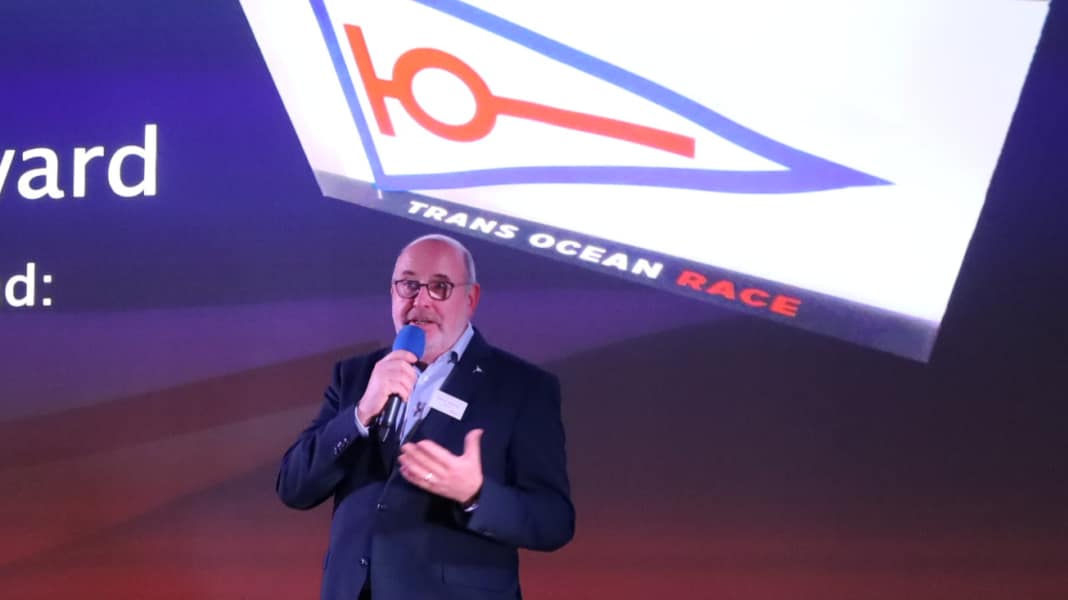
The association is going through a phase of change. Now the Chairman of the Board, Marcus Warnke, has been elected for a second term of office. YACHT spoke to him on the fringes of the award ceremony last Saturday (8 November 2025). In the interview, he talks about the reorganisation of an association steeped in tradition, new records, the changes in cruising sailing - and why not every TO member has to sail around the world.
Mr Warnke, Trans-Ocean has undergone changes in recent years. How would you describe these?
The association has reorganised itself over the past three years. We have formed a new Executive Board team and revised various internal processes. Corona has not harmed us in any way, on the contrary: we were able to use this time for restructuring.
How has your membership structure developed?
At the end of the last financial year, we had 5,500 members, which corresponds to growth of 6.2 per cent. According to our long-standing employees in the office, this is a historic high.
We have also introduced partner membership. This change has increased the proportion of women in the association. In the past, it was often only the man who was a member as the skipper, while the female partner had no formal access to the association - for example at general meetings. Today, around two thirds of new memberships are partner memberships, where both partners pay half the membership fee.
Does that mean more women are sailing now?
With partner membership, everyone pays half a contribution. It is no longer so easy to deduce who is the owner. However, it is still common for the actual responsibility on board to be distributed asymmetrically, with the man as the skipper. In my opinion, this is not ideal, but it reflects the reality on many boats.
How is demographic change affecting you?
The age structure has broadened. Whereas in the past many members only joined us after their working life, i.e. after the age of 60, we now see more members in their 30s and 40s. The boomer generation is still strongly represented, but we are getting younger overall. Especially since coronavirus, we have seen an increased interest in travelling for longer - whether with the family, as a liveaboard or in the "boat office".
Do all Trans-Ocean members have to sail around the world?
No! There are also members who do a big Baltic Sea tour over three months. You can discuss whether that is "transoceanic" or not. From my perspective, it's dedicated cruising. If you have to deal with technical problems in northern Finland, it's not much different than somewhere in the Caribbean - there are even fewer shipyards up there.
The perceived entry threshold is still a real challenge for us. Many people think: "Trans Ocean - that's the round-the-world sailing club. If I haven't sailed at least to the USA and back, I'm not in the right place." That's rubbish!
Our claim is "The sea in your heart", and you don't only have the sea in your heart when you've travelled across the big water umpteen times.
We are an association of people who are predominantly owners, which is why we have an incredible amount of technical expertise in the association. I would like to take away the shyness: If you want to be committed to cruising and maybe manage 500 miles in the summer, then you've come to the right place.
You are also very active online, what does that have to do with offshore sailing?
The microseminars have made a huge contribution to the fact that we are doing so well with our membership today. They were launched during Corona by our long-standing members Bert and Marlene Frisch. What they are doing is now sensational. It has become a kind of virtual clubhouse.
People come, even if they have heard the topic three times before, because they simply want to come together. It makes the community tangible and shows: We share knowledge. These are two key elements that characterise the association.
What about the club's regatta activities?
The association was originally founded to promote ocean sailing in order to enable participation in regattas. We used to support a Class Mini from time to time, but now we support two Minis, an OD 30, three Class 40s and other boats at the same time.
Never before have there been so many sailors sailing under the TO banner at regattas as this year. This also shows that something is happening in offshore sailing in Germany in general.
And what are the plans for the future?
I believe that we will be dealing with the issue of training at a different level. I'm hearing from the scene, including from insurers, that nautical knowledge is declining. If people allow themselves to be disembarked from a 60-foot catamaran because a bit of water runs in at the rudder, then something is wrong.
We also need to keep an eye on what happens with the draft bill to change the driving licence system. We have a strong interest in ensuring that the quality of training improves and becomes more practice-orientated.
I also enjoy initiating topics such as our Citizen Science project, in which our members collect marine data for GEOMAR, or the Short-Handed Rescue project, in which couples learn how to rescue each other when going overboard. 95 per cent of our members are travelling in pairs, and the standard rescue procedures do not work the way they are taught.

Ursula Meer
Redakteurin Panorama und Reise
Ursula Meer ist Redakteurin für Reisen, News und Panorama. Sie schreibt Segler-Porträts, Reportagen von Booten, Küsten & Meer und berichtet über Seenot und Sicherheit an Bord. Die Schönheit der Ostsee und ihrer Landschaften, erfahren auf langen Sommertörns, beschrieb sie im Bildband „Mare Balticum“. Ihr Fokus liegt jedoch auf Gezeitenrevieren, besonders der Nordsee und dem Wattenmeer, ihrem Heimatrevier.

